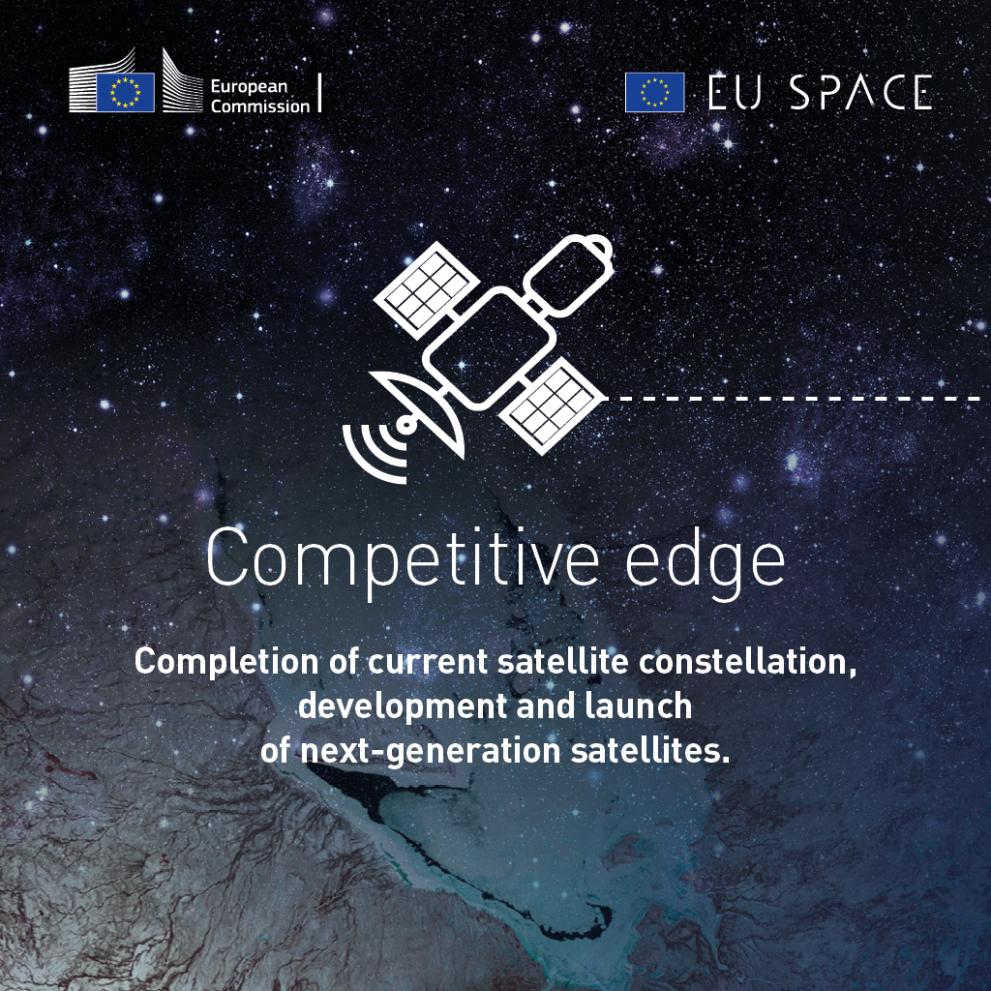DG DEFIS contributes to building resilience, safety and security in many forms:

DG DEFIS contributes to building resilience, safety and security in many forms:
- The EU space infrastructures already play a major role in providing safety and security, but during the coming five years the safety and security related space-enabled services will increase as provided in the EU Space Programme Regulation. Such services play a role in a wide range of settings, for example in emergency and disaster management missions and operations of EEAS, protection of critical infrastructures, in personal safety (Ecall, Search and Rescue), border management, and law enforcement. The security actors using such space-enabled services are equally diverse, and include both civilian and defence actors. The number of such safety and security related services is therefore an impotent result indicator.
- As part of the Space Strategy for Europe the need was identified to ensure that Europe maintains autonomous, reliable, and cost effective access to space. Access to space underpins all space activities, and it is therefore essential to master the technology and operational capability to launch satellites. The proposed EU Space Programme Regulation reflects this need by promoting the procurement and aggregation of launching services and the development of space launch technologies and systems.
- The new industrial strategy for Europe[1] calls for reinforcing Europe’s industrial and strategic autonomy. In the Recovery Package of May 2020[2] this is now mirrored in the new InvestEU[3] strategic European investment policy window, which can among others support aerospace and defence. The aerospace and defence ecosystem is hard-hit by the crisis, not least because Member States budgetary situation may not allow for major investments needed in the coming years. The industrial ecosystem, and the objective of reinforced strategic autonomy both benefit from full chain EU level support to dual-use critical technologies, and from R&D (Horizon 2020/Horizon Europe) at component level to the implementation of complex space systems. Other policies, such as screening of Foreign Direct Investment, and the systematic mapping of industrial supply chains are also instrumental in enhancing strategic autonomy.
- DG DEFIS is coordinating, jointly with EEAS, the Commission policies and initiatives relevant to the EU response to hybrid threats, and works with DG HOME and DG CNECT on more general security policies, such as the Security Union, and Cyber Security.
- DG DEFIS coordinates, in close cooperation with DG MOVE, the implementation of the Action Plan on military mobility, which is another classical dual-use domain.
- Europe has the ambition to invest in the development of the technology for a novel integrated, secure and autonomous European space connectivity initiative. It would be built on the basis of the GOVSATCOM component of the EU Space Programme, complementing it with new space segment development with advanced capability and integrated innovative quantum technology built through the EuroQCI initiative.
- A number of activities linked to education and skills, in particular on STEM, are being pursued in the frame of the Blueprint for Sectoral Cooperation on Skills.
Boosting the economy
Space is a strategic sector for the EU with various positive spillover effects on the entire economy, contributing to job creation, economic growth and EU security. Access to space is a key enabler and indispensable element in the overall space value chain: without access, there is no space policy.
In line with the Space Strategy for Europe (COM(2016)705), ensuring independent, reliable and cost-effective access to space is a political imperative for the EU.
Ecosystem for Entrepreneurship
Europe’s 25 million small and medium enterprises (SMEs) are the backbone of the EU economy. They employ around 100 million people, account for more than half of Europe’s GDP and play a key role in adding value in every sector of the economy. The Commission aims at considerably increasing the number of SMEs engaging in sustainable business solutions by using digital technologies and at making Europe the most attractive place to start a small business, making it grow and scaling up in the single market.
In this perspective, the Commission’s focus on the space sector is on start-ups developing innovative solutions based on EU space technologies, space data and services. The EU Space Programme will promote the emergence of a European New Space eco-system to foster entrepreneurship and to promote the European space industry. The New Space Entrepreneurship Initiative “CASSINI” will offer comprehensive support from idea raising to business incubation, seed-funding and pre-commercial procurement to promising start-ups with a strong entrepreneurship spirit.
Increase efficiency in agriculture and fisheries: satellite-enabled applications improve the mapping of cropland in need of irrigation, harvest forecasts, and fisheries control. This guarantees better food quality and security while safeguarding the environment.
Protect the environment and help tackle climate change: environment monitoring provides crucial information on vegetation, ocean currents, water quality, natural resources, atmospheric pollutants, greenhouse gases and the ozone layer.
Improve citizens’ health: space-based applications can significantly improve patients‘ healthcare and health education through remote medical support. They also help in preventing or mitigating the outbreak of a disease.
Improve crisis response: satellite services help shorten response times in emergencies. Swift damage images and assessment maps contribute to more efficient planning and relief efforts, and help guide rescue services.
Increase security: satellite positioning, satellite communications and Earth observation contribute to detecting illegal immigration, preventing cross-border organised crime, and combating piracy at sea.
Satellites provide immediate information when disasters, such as earthquakes, forest fires or floods strike, enabling better coordination between emergency and rescue teams.
Optimise transport: when combined with enhanced communication capabilities, highly accurate satellite positioning contributes to a modern and reliable transport sector for cars, planes, and ships. It optimises fleet management, vessel traceability, collision prevention, speed control, assistance for ship manoeuvres, etc.
